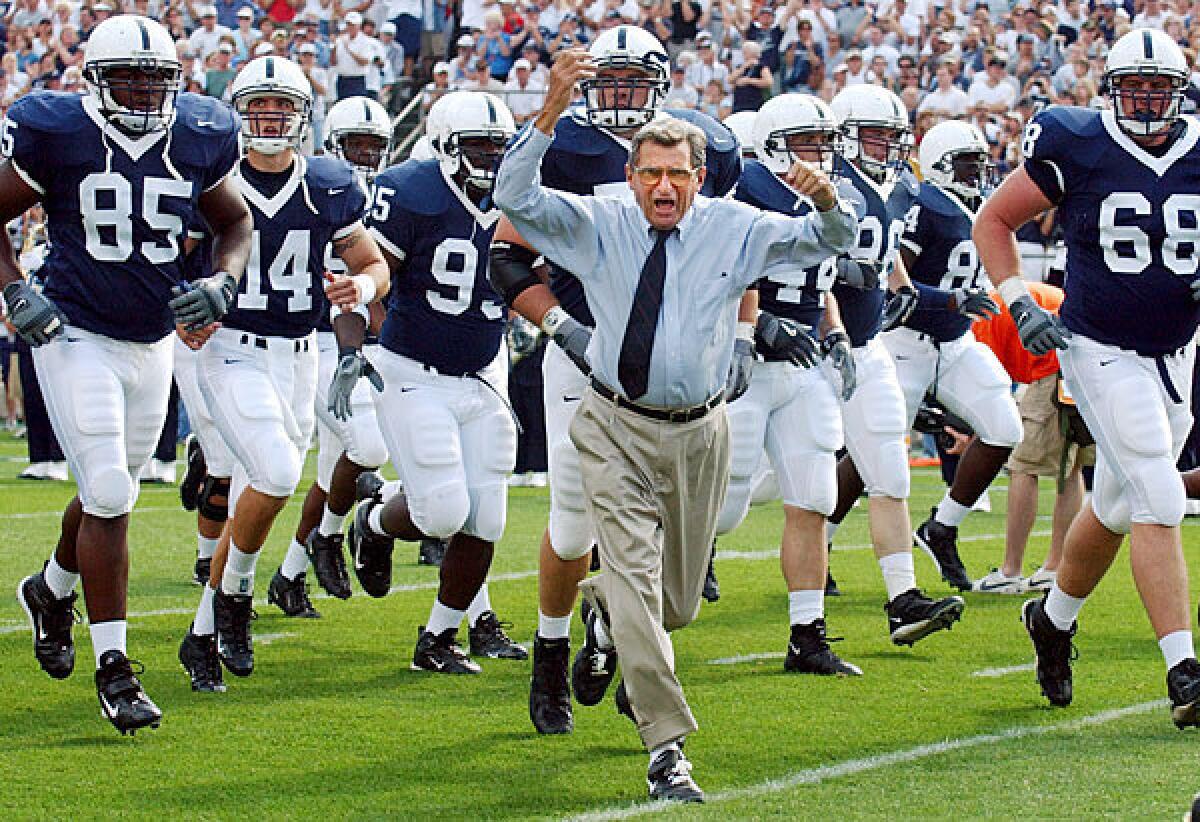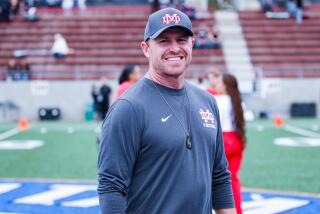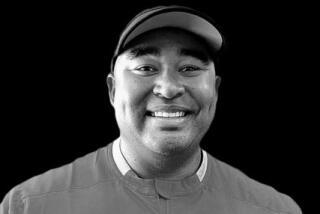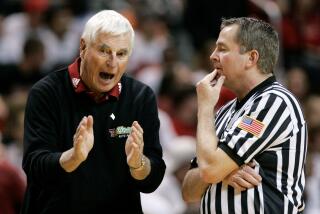Joe Paterno dies at 85; transformed Penn State into football power

During a six-decade career, Joe Paterno transformed sleepy Penn State University into a national football power, creating a legacy that no one thought could be beaten — or tarnished.
But the Ivy League-educated coach who demanded that his players excel in the classroom as well as on the field and was revered by generations of fans, was, in the end, forced out amid a scandal that broke hearts and stoked fierce national debate.
Three months after Penn State’s board of trustees fired him after the arrest of former defensive coordinator Jerry Sandusky on multiple felony counts of sexually abusing boys, Paterno died Sunday in State College, Pa. He was 85 and had been diagnosed with lung cancer in November, just days after his abrupt dismissal.
“His ambitions were far-reaching, but he never believed he had to leave this Happy Valley to achieve them,” the Paterno family said in a statement. “He was a man devoted to his family, his university, his players and his community.”
Paterno was not implicated in a grand jury’s indictment of Sandusky but was criticized for not acting more aggressively in 2002 after a graduate assistant informed Paterno he saw Sandusky sexually molest a boy in a locker room shower at Penn State. Paterno passed the information on to his superior, athletic director Tim Curley.
Paterno’s inglorious exit shocked a community that watched him rise from a young assistant to become a national icon. His Coke-bottle eyeglasses and rolled-up pant legs came to embody the school’s victories-with-virtue persona.
The coach was so beloved in State College that full-size cardboard cutouts of him were common sights around town. Even an ice cream flavor, “Peachy Paterno,” was named after him.
In college football’s fraternity, he was known simply as “JoePa.”
But on Nov. 9, 2011, five days after the scandal broke, the board of trustees fired Paterno three games short of completing his 46th season as head coach.
Former Nebraska Coach Tom Osborne, who won three national titles in the 1990s, suspects the scandal took a toll on Paterno’s health and detracted from his otherwise stellar career.
“His longevity over time and his impact on college football is remarkable,” Osborne said in a statement: “Anybody who knew Joe feels badly about the circumstances. I suspect the emotional turmoil of the last few weeks might have played into it.”
The board of trustees denied Paterno’s request to retire at the end of the 2011 season. Only days after he issued a tempered response to the initial Sandusky allegations, Paterno expressed heartfelt remorse over what had happened on his watch.
“I am absolutely devastated by the developments in this case,” Paterno said in a statement released hours before he was fired. “I grieve for the children and their families, and I pray for their comfort and relief.”
He vowed to “spend the rest of my life doing everything I can to help this university.”
Paterno’s career at Penn State spanned more than six decades, beginning in 1950 as a 23-year-old assistant to Rip Engle, who had coached him as a player at Brown. His firing came less than two weeks after he recorded his 409th career victory, which moved him past former Grambling Coach Eddie Robinson on major college football’s all-time list.
Paterno was a five-time national coach of the year, won two national titles, fielded five unbeaten teams and was the first major college coach to eclipse Bear Bryant’s victory record of 323.
Paterno ended his career as the all-time leader in bowl appearances (37) and bowl victories (24) and in 2006 was inducted into the College Football Hall of Fame. He is the only coach to have won all four of college football’s major bowls: Rose, Fiesta, Orange and Sugar.
Voted into the same Hall of Fame class, Paterno and Florida State Coach Bobby Bowden spent years jostling for the all-time major college win record.
“History will say he’s one of the greatest,” Bowden said Sunday. “Who’s coached longer, who’s coached better, who’s won more games, who’s been more successful than Joe? Who’s done more for his university than Joe?”
During Paterno’s tenure, Penn State produced 79 first-team All-America players, 33 first-round NFL draft picks and 16 National Football Foundation scholar-athletes.
The list of those who played for Paterno includes Jack Ham, John Cappelletti, Franco Harris, Lydell Mitchell, Curt Warner, Shane Conlin, Matt Millen, Todd Blackledge, Kyle Brady, LaVar Arrington, Larry Johnson, Courtney Brown and Kerry Collins.
Paterno’s teams were known for their toughness and selflessness. The school’s blue-and-white uniforms were famously nondescript — lacking player names, decorations or logos — a Brand X quality that came to symbolize the program’s team-first image.
An English literature major at Brown University in Rhode Island, Paterno was a voracious reader whose favorite sayings included Robert Browning’s “Ah, but a man’s reach should exceed his grasp, or what’s a heaven for?”
Paterno was a demanding and relentless coach, a meticulous note-taker and a stickler for detail.
For years, he devised the game plans and called plays for the offense and defense.
His brother, George, once told Sports Illustrated: “Joe’s the most intensely competitive man I’ve ever known.”
Penn State was a virtual autocracy under Paterno, who ruled without much resistance in a remote college town miles removed from the big-city media glare. His practices were closed and so, mostly, were his lips.
Ron Bracken of the Centre Daily Times, based in State College, once described Paterno as “cranky, tyrannical, dictatorial, blunt, scathing, charming, beguiling, entertaining and witty, all in the span of 30 minutes.”
Playing football for Paterno wasn’t always easy, and sometimes it took years for players to appreciate his motives and tactics. He did not forge close relationships.
Cappelletti, a running back who won the Heisman Trophy in 1973, told The Times in 1998, “I was co-captain, but I never remember approaching Joe one time to have a conversation with him.”
Ham, the great Penn State linebacker and Pittsburgh Steelers star, once said, “All of us disliked Paterno. It made us closer. He was very cold to his players.”
Years later, however, Ham chose Paterno to be his presenter at his induction into the Pro Football Hall of Fame.
Ted Kwalick, a former Penn State tight end, once remarked, “The older I get, the smarter Joe Paterno is.”
Paterno used his celebrity, income and pulpit as football coach to help enhance the university’s reputation. He and his wife, Sue, who met when Paterno was a Penn State assistant and she was a student, donated more than $4 million to numerous Penn State projects.
“I do want to make an impact,” he told The Times in 1998. “I’d hate to walk away from this after 50 years or so and look back and say, ‘He had a couple good football teams.’ I’d hope that apart from having some good football teams here, some people have benefited by being in the program, and were better people for having been a part of it.”
Joseph Vincent Paterno, the son of second-generation Italian immigrants, was born Dec. 21, 1926, in Brooklyn, N.Y. Angelo, his father, and his mother, Florence, expected big things from the oldest of their four children. His father was a court clerk who earned his law degree at age 40.
“If we had a classroom spelling bee, I was expected to win it,” Paterno said in the 1998 biography “No Ordinary Joe.”
At Brooklyn Prep, Paterno was a scrappy, skinny and savvy quarterback and an inquisitive student. Summoned for military service after high school, he was training in New Jersey when World War II ended. After his 1946 discharge, he enrolled at Brown.
He played football and basketball in college and embraced academics, calling Brown an “intellectual feast.” He was an accomplished defensive back — he still holds the Brown interception record with 14 — and a good enough quarterback to lead his team to an 8-1 record as a senior.
Engle, Brown’s coach, left the Ivy League program in 1950 to become coach at the Penn State powerhouse. He asked a young Paterno to join his staff.
Paterno postponed law school at Boston University to give coaching a try. He initially hated State College and told Engle he wouldn’t return for a second season. “I’m going to go nuts in this hick town!” Paterno proclaimed.
Paterno advanced quickly on Engle’s staff — “a brazen young man,” one assistant said of him — taking on more and more responsibility. He used an offer from Yale in the early 1960s to leverage assurance he would succeed Engle. When Engle retired in 1965, Paterno got his Penn State job. He was 38.
He staggered into head coaching in 1966 by losing three of his first five games. His first team finished 5-5, and he opened the 1967 season with a loss to Navy.
“I wondered whether I really had it,” he said of his abilities.
After a loss to UCLA on Oct. 7, 1967, Penn State went 31 straight games without a defeat.
It was during this time that Paterno went public with his “Grand Experiment” idea that emphasized academics.
“Everyone assumes if you have a great football team, there have been some sacrifices made in the area of standards,” he told the Philadelphia Daily News.
Some would view the notion as holier than thou. Yet while Penn State had its share of off-the-field problems, the school never incurred major NCAA violations on Paterno’s watch.
Earning football respect, though, was a battle Paterno waged for years.
His teams in 1968 and 1969 went 11-0 but finished second both seasons in the Associated Press poll.
Penn State, which played as an independent until 1993, was penalized by pollsters for facing inferior competition.
Paterno was a strong playoff proponent, and his frustration may have influenced him in 1972 to consider a $1.4-million offer to coach the NFL’s New England Patriots. He accepted in principle before changing his mind.
He would remark at a 1973 commencement address, “Money alone will not make you happy. Success without honor is an unseasoned dish.”
Paterno’s frustration continued in 1973 when his 12-0 team ended up fifth in both major polls, the Associated Press and UPI. He bought his players championship rings and continued to press for a playoff.
His quest for a national title was finally realized in the 1982 season when a Penn State win over Georgia in the Sugar Bowl pushed the Nittany Lions to No. 1. Paterno claimed his second national title four years later after a win over Miami in the Fiesta Bowl.
In 1993, after more than 100 years as an independent, Penn State became the 11th member of the Big Ten Conference.
In 1994, Penn State capped a 12-0 season with a Rose Bowl win over Oregon, but the Nittany Lions ended up No. 2 behind Nebraska in both the Associated Press and USA Today/CNN polls.
Competing in the Big Ten would become increasingly difficult.
Penn State endured four losing seasons in a five-year span beginning in 2000, prompting calls by some for Paterno to retire. There were websites devoted to his departure, but Paterno vowed to coach as long as his health allowed.
Paterno exacted revenge on detractors when his 2005 team finished 11-1 and defeated Florida State in the Orange Bowl.
His survivors include his wife, Sue, whom he married in 1962, and children Diana, Mary, David, Jay and Scott — all Penn State graduates — and 17 grandchildren.
More to Read
Start your day right
Sign up for Essential California for the L.A. Times biggest news, features and recommendations in your inbox six days a week.
You may occasionally receive promotional content from the Los Angeles Times.







